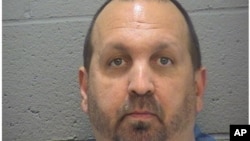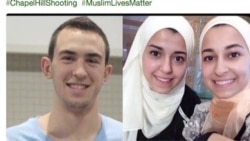Police in the U.S. state of North Carolina said three people were shot to death over a parking dispute near a university.
Craig Stephen Hicks, 46, faces first-degree murder charges in the slayings of Deah Shaddy Barakat, 23, his wife, Yusor Abu-Salha, 21, and her sister Razan Abu-Salha, 19, of Raleigh.
The three victims, all Muslim, were found dead Tuesday in an apartment complex outside the University of North Carolina at Chapel Hill.
The father of the two dead sisters issued a statement saying, "This was not a dispute over parking. This was a hate crime," Mohammad Abu-Salha, a psychiatrist, told the Raleigh News-Observer.
Watch a related TV report by Jerome Socolovsky:
Mohammad Abu-Salha the women had complained about the suspect to him previously. He said that he did not believe it was a parking dispute that led to the shootings, but rather a hate crime, based on the women's conservative dress and religious beliefs.
“It was execution style, a bullet in every head,” Abu-Salha said. "This man had picked on my daughter and her husband a couple of times before, and he talked with them with his gun in his belt. And they were uncomfortable with him, but they did not know he would go this far.”
Comments on social media
Hicks had posted anti-religious statements on social media; however, authorities have not disclosed a motive in the killings.
He is currently being held without bond. The local police department said the accused is cooperating with authorities.
Chief Chris Blue of the Chapel Hill Police Department said, “Our investigators are exploring what could have motivated Mr. Hicks to commit such a senseless and tragic act. We understand the concerns about the possibility that this was hate motivated and we will exhaust every lead to determine if that is the case.
"Our thoughts are with the families and friends of these young people who lost their lives so needlessly,” Blue said.
U.S. Attorney Ripley Rand said his office was monitoring the investigation, but that it was not yet a federal investigation. He said the shooting appeared to be “an isolated incident ... not part of a targeted campaign against Muslims."
Nihad Awad, national executive director of the Council on American-Islamic Relations, wants police to look into potential religious reasons.
“Based on the brutal nature of this crime, the past anti-religion statements of the alleged perpetrator, the religious attire of two of the victims, and the rising anti-Muslim rhetoric in American society, we urge state and federal law enforcement authorities to quickly address speculation of a possible bias motive in this case," Awad said.
However, Abdullah Antepli, director of Muslim affairs at nearby Duke University, issued a statement calling for people not to jump to conclusions over the motive for the killings.
#MuslimLivesMatter
The hashtag #MuslimLivesMatter was trending nationally on Twitter early on Wednesday, with many postings discussing the shooting. It is also trending in the United Kingdom and other countries in the Middle East, including Egypt and Saudi Arabia.
A University of North Carolina statement said police responded to a report of gunshots at 5:11 p.m. local time Tuesday and found the three victims, who were all pronounced dead at the scene.
The university newspaper describes a heartwrenching scene Tuesday night, as family members arrived at the apartment building where the victims were found, begging police for information. "It’s been hours! Just tell me if he’s alive!” one man cried out.
The university said that Barakat was a second-year student at its dentistry school, his wife was planning on starting there in the fall, while her sister was a student at North Carolina State University.
"Our thoughts are with these members of the [North Carolina State University] family," school officials wrote on Facebook, adding that counselors were on hand for grieving students and faculty.
Both universities extended condolences on Wednesday.
The local Muslim community is also grieving; the victims were active members and helped expand volunteer services in the area.
"As we mourn their tragic loss, we are also inspired to see how much these young people accomplished in their short lives. In an increasingly individualistic world, their lives stand as a shining example to young people all over the world," said Abed Ayoub, the president of United Muslim Relief, an organization where the victims volunteered.
Diaa Bekheet contributed to this report from Washington. Some material for this report came from Reuters and AP.







